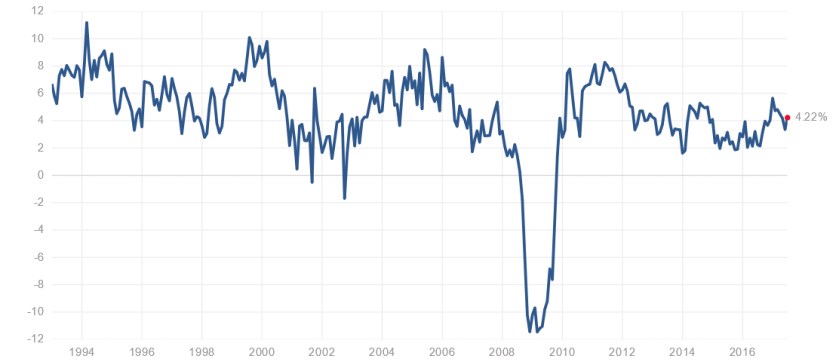Another list came out this week — retail chains closing the largest number of stores this year. No surprise here. We’ve been hearing about closing for months, with every management team blaming the closings on the growth of consumer buying on the Internet.
That’s a convenient excuse, but it’s probably not true. Certainly not in every case.
If Internet shopping were the culprit, we would expect
- All retail chains selling the same products to be affected, and
- The level of impact to be similar from one chain to the next.
Neither of those is true.
Overall, Kiplinger is calling for a 4% growth in retail sales in 2017 (for the entire year).
- That’s the current rate, but it may be optimistic for the year as a whole, as they are also expecting the pace of hiring to slow. (1)
- Conversely, 4% isn’t a big deal historically, as the chart below shows.(3) The negative trend in retail sales matches the negative trend in US population growth (now at 0.7% per year and declining).
Population change and retail sales are linked. The number of people in the US drives demand for food and clothing, among other things. We aren’t at the point of negative population growth — something Japan has achieved — but that may be in our future.

24/7WallStreet.com has a list of 25 chains closing at least 60 stores, and some of which (e.g., American Apparel) are closing entirely.(2)
Conversely, TJMaxx, Marshall’s and Home Goods have reported growth in same store sales (sales at stores open at least a year).(4) While sales at TJMaxx rose less than expected in the first quarter of this year (5), it was still an increase, and not the 11.5% decline that Sears has incurred (6).
That’s the point. If e-commerce were a paradigm shift in how consumers shop. We wouldn’t see the variations in results between different stores. It’s time to place the blame where it belongs — on poor decisions by management. Those poor decisions are damaging investors and employees.
That happens when you have management basing decisions on “gut feel” or cutting corners on market research. Not that gut feel is inevitably bad; it’s just very high risk.
And finally,
The people who are advocating border walls need to understand the economic impact of lower population growth in the US.
(Originally posted on Crain’s Comments, vlcrain17.wordpress.com)
Sources:
- http://www.kiplinger.com/article/business/T019-C000-S010-retail-sales-consumer-spending-forecast.html
- http://247wallst.com/special-report/2017/08/24/22-retailers-closing-the-most-stores-2/
- http://www.multpl.com/us-retail-sales-growth
- http://www.foxbusiness.com/markets/2017/02/22/tjmaxx-marshall-s-home-goods-bucking-retail-trend.html
- http://www.foxbusiness.com/markets/2017/05/16/slowing-sales-growth-at-tjmaxx-marshalls-parent-stokes-retail-industry-concern.html
- https://www.cnbc.com/2017/08/24/sears-q2-earnings-2017.html